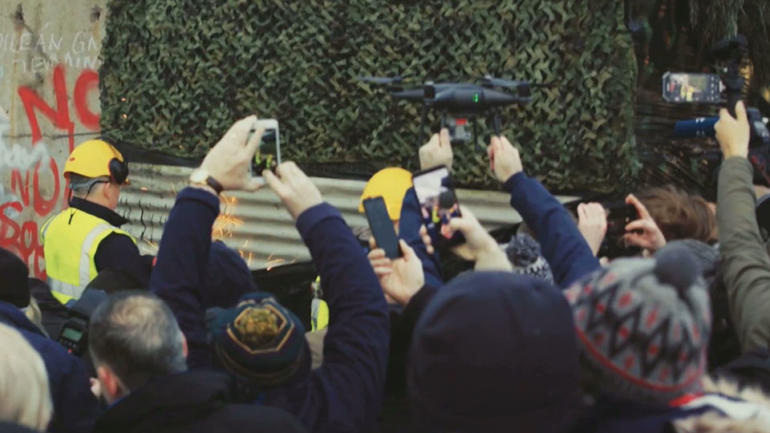Fierce campaigning in Britain over a new Brexit plan. Lawmakers will vote on new plans to leave the European Union on Tuesday. Food companies said there will be shortages if Parliament doesn’t pass a deal by the end of March.
A no-deal Brexit could also revive barriers between Ireland, which remains in the EU, and Northern Ireland, which is part of Britain. Residents fear that would endanger a fragile peace plan that ended decades of violence. CGTN’s Mariam Zaidi has details.
Down a country lane, little known to those not from these parts, is the border separating Northern Ireland from the Irish Republic. Road traffic signs are the only clues to your location. As we drive down the road, local residents point out landmarks and remember how it used to look.
“We’re actually in the North at the moment,” Seamus said. Kevin added, “There would have been old military checkpoints and installations there but they’re gone.”
Seamus remembers the checkpoints and the problems they caused. “For the local people, it would have been a big disruption in their daily life and to get to the other side there would have had to do a detour and turn 20 miles in some cases.”
In the 1960s, when The Troubles started, Northern Ireland was plunged into a war between the republicans and the unionists. By the 1970s, the British army had established checkpoints, effectively sealing the border to restrict the movement of paramilitaries.
Today’s open borders are part of the legacy of the 1998 Good Friday Peace Agreement. The people of the border communities fear a return to the past in the event of a No Deal Brexit.
“My family has lived in this area for several hundred years and we have never in our lifetime seen this area as peaceful, as happy, as economically prosperous as it has become in the last 25 years,” said resident William Tennison. “So don’t play dangerous games with people’s livelihood and with a border in Ireland, which has been associated in the past with so much violence and misery.”
Ahead of a key Brexit vote in Westminster, border communities are making their voices heard.
“We’ll not accept a border on this Island,” said the speaker at one rally. “That border should be in the Irish sea. Theresa May sort out your own problems in your own country.”
A dramatic reenactment of the past, complete with soldiers and guns. The people that live across this porous border refuse any type of border. And as quickly as they put it up, they hack it down.
Today, Northern Ireland’s demographic is more evenly split between Catholics and protestants. With the prospect of an uncertain future under Brexit, calls for reunification with the Republic are gaining traction. This red and white tape is lifted up & down for people to pass. Grasped gently between two fingers, it perhaps conveys the simplest message of all.
On Sunday, some welcome news for the border communities. Ireland’s European Affairs Minister Helen Mcentee said they were not planning for a hard border and that Ireland would not accept a time-limited backstop in the Brexit Withdrawal agreement, as it was the only way to protect peace and the Good Friday agreement. All eyes are on Westminster as British MPs vote on the Brexit Plan B on Tuesday.
 CGTN America
CGTN America
